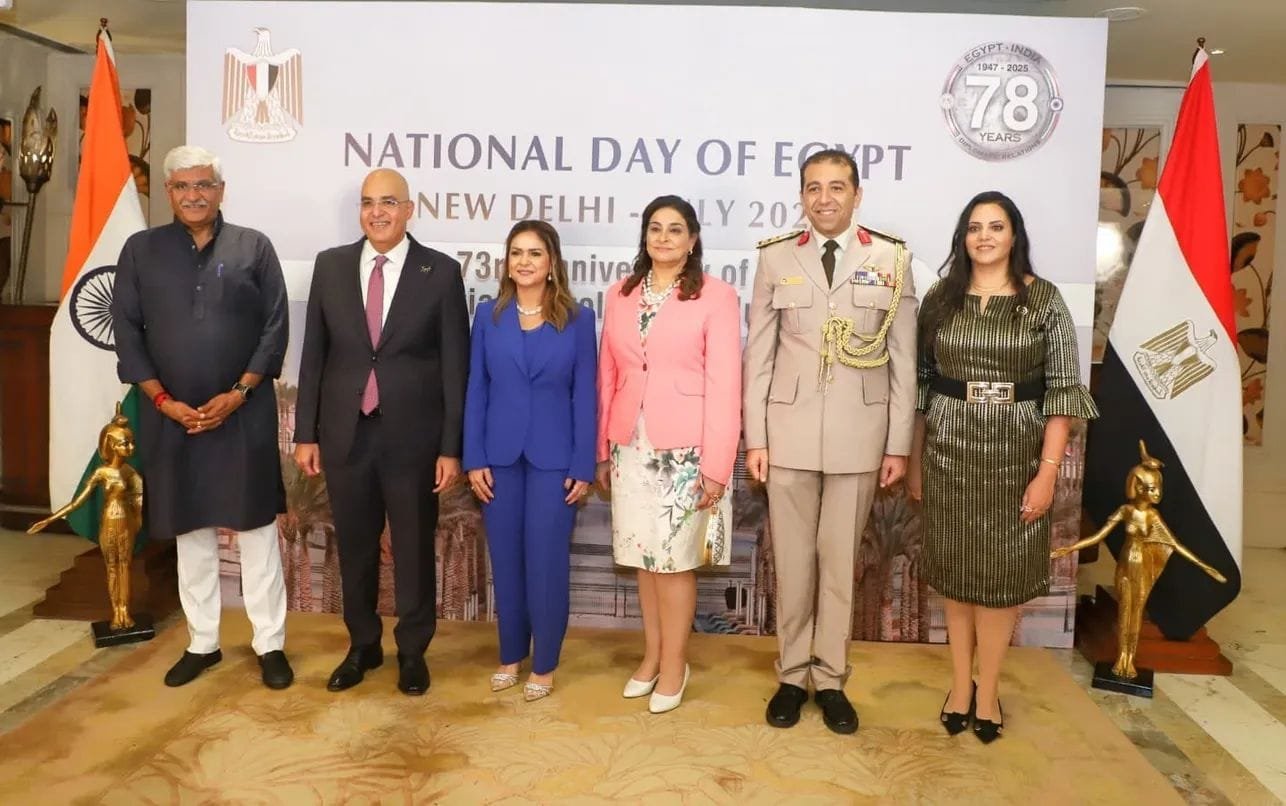
In a reception held at ITC Maurya, New Delhi on July 8, 2025, H.E. Mr. Kamel Zayed Kamel Galal, Ambassador of Egypt to India, addressed a distinguished gathering of diplomats, policymakers, business leaders, and members of the Indian-Egyptian community to commemorate the 73rd anniversary of the Egyptian Revolution of July 23, 1952.
Shri Gajendra Singh Shekhawat, Honourable Minister of Culture and Minister of Tourism, Government of India, graced the event as the Chief Guest.
In his keynote address, Ambassador Galal described the Revolution as “a transformative milestone, not only in Egypt’s modern history but also across Africa, the Arab world, and among all nations aspiring for freedom, justice, equality, and self-determination.” He emphasised that the July Revolution was not simply a shift in governance but the culmination of Egypt’s millennia-long journey toward building a modern, inclusive, and forward-looking state.
Reflecting on Egypt’s civilisational legacy, the Ambassador observed that “Egypt has, over the past decade, embarked on a bold and forward-looking path of national transformation. We are embracing the future while drawing upon the lessons of our past, striving to unlock the vast potential of our people and institutions.” He quoted renowned Egyptologist Toby Wilkinson to drive home the timeless spirit of his country: “The grandeur of ancient Egypt lies not in what it is, but in what it inspired.”
Ambassador Galal also reaffirmed the strong foundation and evolving growth of India-Egypt relations, which, he noted, stretch back to 2500 BCE. “It comes as no surprise that Egypt and India, two great and ancient civilisations, enjoy a very special relationship,” he said, citing historical connections that have grown stronger through trade, diplomacy, and cultural exchange.
Tracing the arc of modern political ties, he recalled the legacies of leaders like Saad Zaghloul and Mahatma Gandhi, and later, President Gamal Abdel Nasser and Prime Minister Jawaharlal Nehru. He hailed both nations as founders of the Non-Aligned Movement, which “continues to uphold the principles of sovereign equality and multilateral cooperation.”
The Ambassador highlighted the 2023 signing of the India-Egypt Strategic Partnership Agreement as a significant leap forward, adding that it “opens endless opportunities and potentials for cooperation, not only on the bilateral level, but also in dealing with contemporary global challenges.” With bilateral trade touching USD 5.1 billion in 2024–25, he called for expanding this figure to USD 20 billion, noting that Indian investments in Egypt—currently USD 4 billion—remain far below potential.
Among the key incentives Egypt offers are a dedicated investment zone in the Suez Canal Economic Zone and access to a vast network of free trade agreements across Africa, the Arab world, and Europe. He added that India-Egypt defence cooperation, already strong through joint military exercises, holds promise for joint production and maritime coordination. On the people-to-people front, he pointed to simplified visa procedures for Indian citizens and direct EgyptAir flights from Cairo to Delhi and Mumbai as enablers of cultural and tourism exchange.
In a heartfelt moment, Ambassador Galal underscored the moral responsibilities that come with being an ancient civilisation. He reiterated Egypt’s support for multilateralism and its nomination of Professor Khaled El-Enany for the position of Director-General of UNESCO. “He proposes an organisation that protects, but also inspires; that acts, but also listens,” the Ambassador said, championing a UNESCO that is “capable of safeguarding tangible and intangible heritage, promoting inclusive education, and giving rightful praise to youth, women, creators, and local communities.”
Turning to the crisis in Gaza, the Ambassador spoke with urgency and clarity. “Egypt cannot remain silent in the face of the humanitarian catastrophe unfolding in Gaza. Under the pretext of self-defence, the Israeli occupation has led to the tragic loss of nearly 61,000 innocent lives—including 18,000 children,” he stated, calling on the international community to act. “History will hold us accountable for the silence and inaction of the global community.”
While acknowledging Egypt’s diplomatic engagement with all regional stakeholders, including Israel, he firmly reiterated Egypt’s commitment to opposing forced displacement in Gaza and the West Bank. “Egypt will continue to stand firm against violations of sovereignty, whether in Lebanon, Syria, or Qatar,” he affirmed.
Recalling the peace initiative of President Anwar El-Sadat in 1977, the Ambassador reinforced Egypt’s role as a catalyst for peace in the Middle East. “Peace is not just an agreement. It’s a vision of hope for future generations,” he declared. Egypt, he said, remains committed to facilitating a ceasefire in Gaza, enabling humanitarian aid, leading reconstruction efforts, advocating for a two-state solution based on 1967 borders, and working toward a nuclear weapons-free Middle East.
He concluded with a deeply symbolic line that captured the spirit of the evening: “Where there is peace, there is Egypt. And where there is Egypt, there is hope.”
Leave a Reply